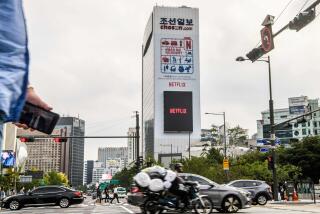International Business : Cable Arrives to Revolutionize South Korea, for Better or Worse : Television: 20 new channels spark fears of Western culture’s influence. U.S. programmers embrace opportunity.
- Share via
SEOUL, South Korea — It will introduce kids to basketball star Shaquille O’Neal and could cause addictions to steamy American soap operas.
South Korea’s 20 cable TV channels began broadcasting Wednesday, promising to revolutionize the viewing habits of an audience whose tastes have long been smothered by government-censored programming.
The arrival of cable opens a market for American programs in a country where parents already lament that their children are all too eager to embrace things Western.
“We hope cable TV will satisfy more diverse cultural demands and open a wider world for the Korean people,” President Kim Young Sam said in a congratulatory message on the launch of the channels.
A host of American companies--Viacom, Turner Broadcasting System, Capital Cities/ABC, Warner Bros. and Twentieth Century Fox--have already struck deals to sell programming.
Viacom’s MTV signed a deal with Seoul’s M.Net. The all-music channel plans three hours of prime-time MTV staples, such as “MTV Top 20 Countdown” and the “MTV Unplugged” concerts segments.
“Music videos have been a big hole in Korea’s music industry,” said M.Net spokeswoman Hong Ji Yoon. The deal will produce programs geared to local audiences to “make the channel as Korean as possible,” she said.
The country’s five public channels shut down Tuesday; South Koreans will now be able to choose from movies, sports, home shopping and news--10 to 24 hours a day, for about $21.50 a month.
Cable TV will initially reach only 230,000 households because of delays in installing the cable lines and decoders, the Korean Cable Television Assn. said.
To encourage people to sign up, 48 cable providers across the country will send out unscrambled signals free of charge for two months.
Experts say cable TV will boost the economy by creating 30,000 jobs and generating $8.9 billion in annual revenues. They predict home shopping channels to change the way people spend, and the advertising industry will have more hours to hype its wares.
“We expect to reach the break-even point in five years,” Hyun So Hwan, president of YTN, a 24-hour news channel owned by the national news agency Yonhap, said at a recent news conference.
Satellite dishes are also becoming common, beaming Japan’s NHK and Hong Kong’s STAR-TV directly into homes. They will get their full blessing from the government when Seoul launches its first satellite in July.
However, foreign programming has left regulators wondering how much and how fast South Korea should open its doors to other cultures.
Like the rest of Asia, South Korea is finding America far tougher to beat in entertainment than in any other trade arena. American movies and music have proven to be far more competitive than other products.
Every street corner has a video store packed with Hollywood titles. Theaters had long lines for “Forrest Gump,” “True Lies” and other U.S. box office hits.
“It is an industry we have never experienced, and it involves a lot of risks,” Yoo Huk In, chairman of the Korea Cable Communications Commission, told a local magazine.
Just last year, public TV pulled the movie “The Crying Game” and the U.S. TV series “Beverly Hills 90210” amid criticism that they were unwholesome.
Critics charge that the onslaught of foreign programs will also make it harder for the local industry to survive.
The government hopes to mitigate cultural shock and help support local programmers by imposing quotas. Cable channels must have at least 70% domestically produced programming; sports and documentary channels have a 50% quota.
More to Read
The biggest entertainment stories
Get our big stories about Hollywood, film, television, music, arts, culture and more right in your inbox as soon as they publish.
You may occasionally receive promotional content from the Los Angeles Times.










